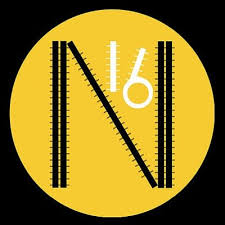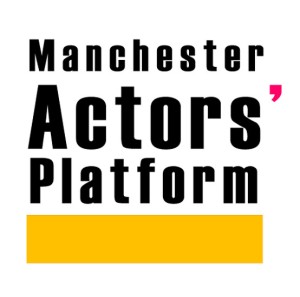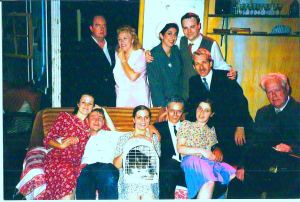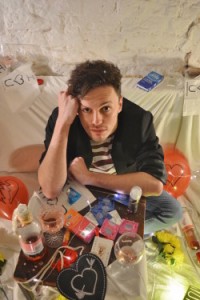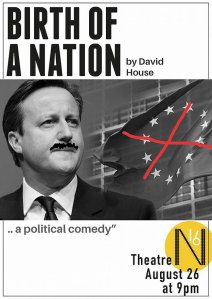When did you first realise you wanted to act?
Month: December 2016
Sasha Damjanovski
Theatre on The Cheap
Christmas by Simon Stephens
Directed by Jamie Eastlake and Sarah Chapleo
Sunday 11th -22nd December / Sunday Matinee 18th, 4pm
9pm/Tickets £15/£10
The reality is that Christmas is a depressing time for many. With the aftermath of Brexit and Ukip and Farage and the clear manipulation of the white working class for political gain, Theatre N16 are delighted to produce Simon Stephens Yuletide treat. One night in an East end pub, four men confront their past and brace themselves for an uncertain future
The Snow Queen
Directed by Scott Ellis and Tatty Hennessy.
Sun 11th – Thurs 22nd December 19:30 pm/Tickets £15/£10
Greta’s brother, Kay, has been acting strange. He’s mean and moody and won’t play games. The Snow Queen must have snatched him, and left an imposter in his place. With her new friend, the wise-cracking, fame-hungry talking Crow to guide her, Greta must set out across the snow to search for her brother in the Snow Queen’s palace and bring him home in time for Christmas. Funny, magic and full of surprises, this new modern adaptation of The Snow Queen is a perfect family Christmas adventure.
Next Year
So have you been following us for a while now and wondering who we are and after 1 year of scratch nights and becoming more than an # are you wondering what’s next. Well Here I shall welcome you to the team and the plans for the next year at HQ
Founder of Actor Awareness
Tom Stocks (@Tom_Stocks)
The main man and inspiration behind the movement. All round good egg and ideas man. An actor and sometimes writer Tom Stocks is passionate about creating equal opportunity. Securing backing by Spotlight has been a highlight of Tom’s year.
Co-Producer and Blogger
Stephanie Silver (@steffieegg12)
An Actor and aspiring playwright Stephanie co-produces monthly scratch nights and other events under the Actor Awareness banner as well as producing the monthly Blog.
Producer ‘Adam Morley’
Adam Morley is an accomplished Theatre director resident at Canal Cafe and AD of Baroque Theatre. He is the founder of ‘The Adam Morley Bursary’ and helps collobrate with Actor Awareness on different projects.
NEXT YEAR
Next year we aim to continue the scratch nights at Spotlight theatre
Actor Awareness are moving to Manchester so wait this space!!!!
Film Nights for new filmmakers
More affordable workshops for actors and writers
Albane Linyer
When I was a kid I was obsessed with reading. I read very fast and some days I would read three books in one afternoon. It was just very natural for me to start writing my own stories. Being a writer was always my plan for the future and I never really questioned it. I started writing stories when I was about 7. I wrote my first play at nine and it was porn. It was original even though a bit disturbing. Apparently I knew very early on that my work would revolve around desire. Then when I was sixteen I met a Tv producer. He asked me what I wanted to do for a living and I say I wanted to write. He just answered “Go for screenwriting then, you’ll make loads of money.”. He lived in an enormous house with an outdoor jacuzzi in Paris, so I told myself “You want to follow this guy’s advice.”. That’s how I ended up here. You are doing the Saint Martins writing course, what have you got out of this course? |
|
What type writing style do you think you have ? Is writing about women a style? More seriously, I don’t know what style to call it. I try to show different lifestyles to a broad audience and I have mostly women characters. My first feature film is about a sexual fetishism called “pet-play”. This screenplay is a good sum-up of my writing: flawed female characters interrogating a different way to act as a sexual being. I like dark humour, the irony of life coming to bite my characters in the ass. As I am still quite young I expect my writing style to change, but at the moment it is perfectly coherent with who I am and what I want the audience to see. What are you working on right now? I am still working on The Puppy (the movie about pet-play), the screenplay will be ready around June. Also I started writing a Tv series about Sugar Daddy websites. We are lucky to have John Yorke teaching us this semester and he is helping me with that project. In addition, I wrote a novel in French and I am currently gathering feedback to take it to its…1000th draft? Until I find it good enough to try to get it published. You have to be really passionate about writing if you want to make a living out of it, because at some point it is getting a LOT of writing, and rewriting. What advise do you give to new writers I am a new writer! But I would say one thing: always finish what you start writing. Even if it was to be a feature film and you make it a short film or a tv pilot. You can’t go anywhere without a finished project in your pocket. Y need to have something to give them. Also, if you can film what you write, absolutely do it. It is easier to show to producers, but also to friends and family. No one likes reading scripts apparently. And last – that was a lot of advice from a new writer aha – life is hard enough, so write about what you love. |
|
You just had your writing read out out a rehearsed read, how do you find this process useful? This was infinitely helpful from the beginning. Without realizing it you have to pitch the story to your actors, and explain them who they are in the script. You can learn a lot about your character just by selling them to someone else. When I go (really excited) “Hey yours is a complete bitch but she’s gorgeous and badass” I know the character belongs to the story, you have to feel that it fits. During the rehearsing process you are constantly getting various reactions on your text. When at a rehearsal an actress says a line and everyone including you can hear that it does not work, it is amazing. The little uneasy feeling that you had reading the scene on your own finally makes sense. Also, listening to the director when he explains to the actors what is happening makes you immediately know if your writing gives off the right idea. If the director doesn’t get it by reading your script, no one will. Then comes the day of the actual show and this is the last and the most important test: the audience. If they don’t laugh or react to your dialogues, it is bad. Might not even be your writing’s fault, but it might be time to ask around what went wrong. So in a nutshell the process is incredibly helpful because you get to see and hear your work and take it to another level. What is your fav screenplay of all time? There are so many amazing movies and tv shows that it’s horrible to pick just one. I would probably go for American Beauty. It has everything. Fantasy, intolerance, masturbation, sexual disorientation; multiple stories with a fantastic end. |
Headshots/Showreels
New Year New Me
‘New Year New You’ That’s what everyone says right. Well as an actor we’re always trying to keep abreast, make our agents happy, get our foot in the door and at such a cost it feels like an endless expensive task to keep your Spotlight profile or CCP page fresh!
Check out MAP Platform, they are based in Manchester but they provide a guaranteed professional service at some of the cheapest rates around!
They have showreel services from £85 and also Headshots for £75
http://www.maplatform.co.uk/services/4591961256
Please also check out London based photographers
Jennifer Evans (jennifer-evans-photographer.com/@PhotosJevans) & Greg Veit (gregveit.com/@Veit_Photo ) who both provide professional and reasonable headshot services.
Kevin Russell- Director
Actor Awareness ‘Best of Scratch’
They’re teaching our children, but are they teaching the right things? Three young teachers navigate their way through adulthood and educating. A peak inside a state school staff room. With fad diets, Instagram abs and the government imposing a sugar tax, do the educators even know what is good for us? A Geography, History and PE teacher form an unlikely friendship within the dynamics and the solace of the staff room, bonding over all that matters; biscuits and banter. The Staff Room, following it’s 5 star review from London Theatre 1 at Theatre N16 in the Summer, has been offered it’s first professional outing at the Queens Theatre Hornchurch in July 2017.
The Monologues of a Tired Nurse written by Stephanie Silver Directed by Simon Nader
Cast: Sally played by Stephanie Silver/Emily by Emelia Marshall Lovsey
A look at 2 NHS nurses struggle to maintain their head above water. Performed at sell out nights at Edinburgh Fringe Festival 2016. Due for a run 20-26th Feb at Barons Court Theatre 2017 and Wandsworth Fringe at Fragility Takeover at The Cats Back 2017. Supported by RCN Rep and #ScrapTheCap Campaign for nursing pay.
Love and all That Crap by Oliver Retter
“And they all lived Happily Ever After”… Bullsh*t!
Love And All That Cr@p is a light-hearted ‘coming of age’ story about finding love in our modern day society. Follow a young man as he makes his discovery in awkward, amusing and arousing ways such as discovering your sexuality through porn; the naivety of your ‘first time’, a blind date gone terribly wrong and the all too true horrors of a one night stand as well as other stories and experience a cabaret of song, poetry and hilarity in this embarrassingly true story about love and all its unsaid difficulties.
OCD Theatre (Original, Contemporary, Dynamic) emerged from East 15 Acting School’s Contemporary Theatre course and has continued to produce intriguing new work which were praised for their daring and eye-opening subjects
Written & performed by Oliver Retter. With special thanks to Adam Weeks and Lottie Finklaire for their dramaturgical support.
Love And All That Cr@p contains strong language and a ridiculous amount of glitter.
Birth of a Nation written by Dave House & produced by IndigoChildArts
Satirical look at the failings of a Tory government riddled with NHS pains, Boris Johnson and Brexit.
We are very proud of all our plays that have gone on to be developed and hope to hear more about their progress in the future.
Now we look forward to 2017- Deadline for the first scratch with the theme ‘Working Class’ is Jan 7th. Send submissions to tanheartssteph@gmail.com or tomstocks0805@gmail.com. We are looking for 4 shows, 15 minutes long with 3 actors max and 1 director.



